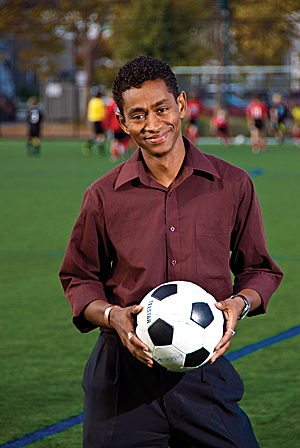Growing up in Ethiopia, all Deutron Kebebew knew about America was what he had seen in the movies.
So he was excited when his father, who had fled the country for political reasons, invited him to come and live in the United States. He imagined the car chases he would see, the cowboys that would ride through town.
But although Kebebew's life turned out to be something like a movie, it was not the one he had imagined. At 14, Kebebew found himself in California's foster care system, living with a family in the small town of Gilroy.
Even though he liked his foster family, Kebebew longed for his parents and felt the sting of being treated differently than the couple's biological children--things like not being allowed to open the refrigerator or having to earn points to participate in the activities he liked. But Kebebew remembered what his mother and grandmother had taught him and vowed not to become angry like some of the 50 to 60 other foster children who flowed through the house with their stories of horrific abuse and neglect.
It was then that he met the first of his "heroes," a junior high teacher who told Kebebew he should run for vice president of the class.
| Related story: Pister's legacy lives on through scholarships |
But the teacher pressed, and Kebebew was elected vice president of his freshman class. Kebebew decided to throw himself into student government, clubs, and schoolwork as a way to keep the sadness and anger at bay. It was that choice that helped him win a prestigious Pister Leadership Opportunity Award at UC Santa Cruz, a $10,000-a-year grant that made it possible for him to attend UCSC. Kebebew was the 2000 recipient of the Thomas B. Porter Scholar award.
"I was so thankful for that opportunity and humbly grateful to the Thomas B. Porter family for their investment in my education," Kebebew said in a voice that still carries a lilting trace of his native country.
He also joined the Smith Scholastic Society, which provides mentors for former foster children at the university and encourages them to mentor others. "It was about creating a caring community," Kebebew said.
Four years later, Kebebew had an electrical engineering degree, but his heart took him back to the children he had met in foster care. He got a job with the Santa Cruz Community Counseling Center, where he worked with foster youth and is now involved in a major research project to study the impact of positive father involvement on children.
But Kebebew always remembers that first day at UCSC as he stood with a favorite social worker and watched parents carrying bags of groceries into the dorms for their children. So when two of the young people he mentors went to college, Kebebew was by their side.
"And I made sure they had all the groceries they needed," he said.



